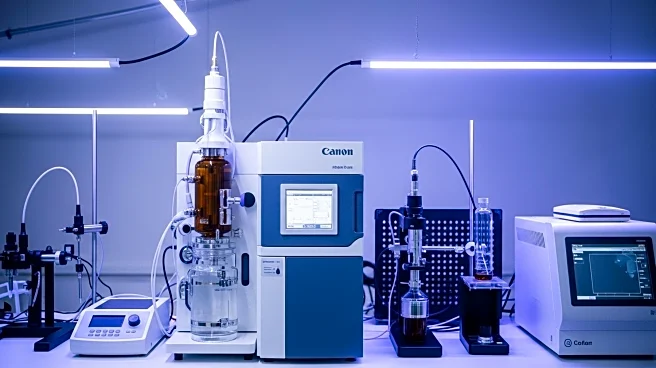What's Happening?
Cambrex, a contract development and manufacturing organization (CDMO), has announced the expansion of its active pharmaceutical ingredient (API) facility in Waltham, Massachusetts, through its subsidiary Snapdragon Chemistry. This expansion includes a new GMP manufacturing suite that increases the facility's footprint by 20%. The suite features an ISO-7 cleanroom for preparative HPLC chromatography and lyophilization, along with cold storage for raw materials and a product storage suite. The facility is designed to support peptide projects from development to GMP manufacturing using solid-phase peptide synthesis (SPPS), liquid-phase peptide synthesis (LPPS), or hybrid approaches. The expansion aims to optimize peptide drug candidate development and reduce manufacturing costs by utilizing LPPS technology, which reduces solvent demand and the need for excess reagents compared to standard solid-state peptide synthesis processes.
Why It's Important?
The expansion of Cambrex's peptide manufacturing capabilities is significant for the pharmaceutical industry, particularly in the development of peptide therapies. Peptides are increasingly used in drug development due to their specificity and efficacy in targeting diseases. By enhancing its manufacturing capabilities, Cambrex can support larger-scale production, making peptide therapies more accessible to a broader patient population. This development also reflects the growing trend of using innovative technologies to streamline drug manufacturing processes, potentially reducing costs and accelerating the time-to-market for new therapies. The investment in LPPS technology highlights Cambrex's commitment to advancing synthetic modalities and optimizing manufacturing processes, which could lead to more efficient and sustainable drug production.
What's Next?
Cambrex plans to continue investing in research and development across complex synthetic modalities, including further innovation in peptide manufacturing. The company is also exploring the application of artificial intelligence to optimize oligonucleotide processes, which could further enhance its manufacturing capabilities. As Cambrex expands its facilities and technologies, it may attract more pharmaceutical companies seeking efficient and cost-effective solutions for drug development. The expansion could also lead to increased collaboration with other industry stakeholders, fostering innovation and potentially leading to new therapeutic breakthroughs.
Beyond the Headlines
The expansion of Cambrex's peptide manufacturing capabilities may have broader implications for the pharmaceutical industry, particularly in terms of sustainability and environmental impact. By reducing solvent demand and the need for excess reagents, the LPPS technology contributes to more sustainable manufacturing practices. This aligns with the industry's growing focus on reducing environmental footprints and adopting greener technologies. Additionally, the use of artificial intelligence in optimizing manufacturing processes could lead to more precise and efficient production methods, potentially setting new standards for the industry.










